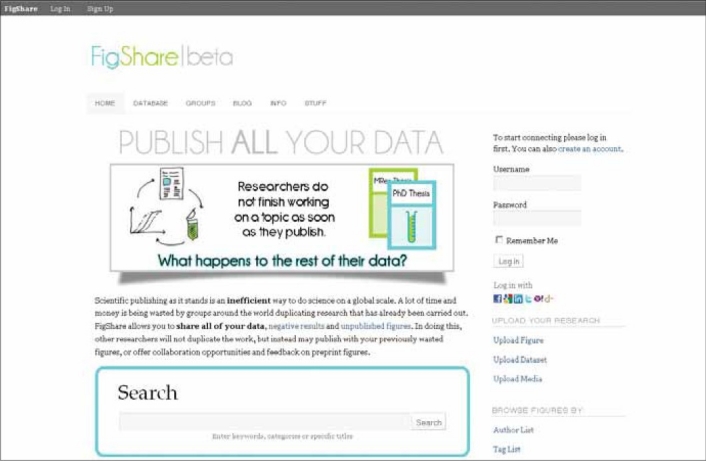
Scientific research activities generate a large amount of data, with most of it not ending up as part of a publication. Among the more common causes of this dilemma is a lack of significance, negative data or data that defy analysis. In numerous instances, even perfectly good data might not be able to withstand the gruelling process of peer review and is thus consigned to the record files.
Electronic publishing is silently but surely bringing about a change in the way in which a traditional publication and the process is perceived. The amalgamation of the semantic web, cloud computing and social media sites has begun to make a difference in the manner in which scientists communicate, gather data or share the triumphs and tribulations of their research. A number of dedicated blogs and specialized groups on popular media networks are actively working toward bridging the gap between how science is visualised and the way it works in the real world.
FigShare (www.figshare.com) is the brainchild of Mark Hahnel, who realised that a large amount of data generated during the course of his PhD would never get published as it did not show any significant difference. He also realised that redoing expensive research experiments and duplicating data could be drastically reduced by simply sharing this already generated data by putting it up in a proper format in a searchable database.
The website that has evolved to its present beta version is supported by Systems Institute, an international not-for-profit organization that provides hosting and looks after future expansion needs. Access to content is granted after free registration or an alternative login through one of the popular social media accounts. The facility to upload figures, datasets or media is accomplished in a simple manner similar to that of making an e-mail attachment. Once the image to be uploaded is located, the rest of the information, viz. the authors, the category and tags, are filled in. There is also an option of linking it to the dataset. The dataset and media-uploading process is similar and all uploading activities have the option of adding a description of the experiment and the methodology. A tabbed discussion page is present on each of the upload pages and will prove to be one of the most useful features in order to help refine search and usability features as the amount of data that is stored increases. Once the data is uploaded, it is instantly cited and allotted a persistent identifier based on the Handle System (http://www.handle.net) thus ensuring efficient searches and security of the stored data for long-term access.
Different categories of data can be uploaded by individuals on FigShare. Preprints and manuscripts that have yet to go through the process of peer review can be instantly distributed; this allows the authors to receive early feedback and may be helpful in revising and refining the article for final submission. A large number of reputed journals have already started publication of preprints in order to simplify the peer review process and increase the acceptability of the final articles.
FigShare also encourages the publication of negative results and data generated from research conducted but not reported (the file drawer effect). This data is available under the Creative Commons Attribution License (CCAL) so that authors retain ownership of the copyright but allow anyone to download, reuse, reprint, modify, distribute and/or copy data from FigShare, provided the original authors and source are cited and included in any publications stemming from the use of this data.
All uploaded data is searchable by author name, tag, dataset or media. Figures can be searched by name or by the category that they belong to. In the near future, data stored by FigShare will be available as a “Science Dataset” for the Comprehensive Knowledge Archive Network (http://www.ckan.net), which will make it easy to find, share and reuse open content and data.
The website in its present beta version has just been released and is yet to attain popular status. The amount of searchable data is very little, but is growing with each day. The simplicity of the idea and ease of use promises to initiate a revolution in the way that research will be shared and published, defying all geographical boundaries.
Footnotes
Source of Support: Nil
Conflict of Interest: None declared


